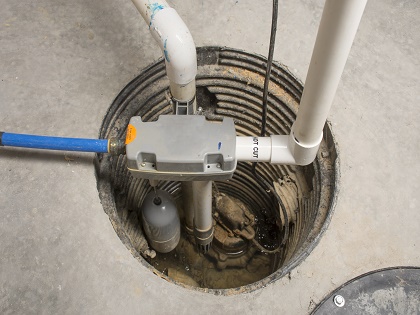Signs It's Time to Replace Your Sump Pump

In heavy rains, you take to your trusty sump pump to protect your basement from flooding. A sump pump essentially is the last line of protection from a flooded basement, massive water damage, and costly home repairs.
But because your sump pump only runs when needed and may not be needed for weeks at a time, you may not notice when it has finally worn out for good. Here are some simple signs you can check and watch out for yourself to prevent pump failure and before waking up to a basement full of water.
How Long Does a Sump Pump Last?
Even if you have professionally installed a quality product, a sump pump should be replaced every 7-10 years. Typically located in a basin on your basement floor, your sump pump collects excess water from drains and redirects it away from the house. Your sump pump’s life expectancy is greatly influenced by how often it has been used, the amount of water it has to displace, and its cycle runtime.
If you don’t know how old your sump pump is, you should consider replacing the pump, or at minimum, have a professional licensed plumber inspect and clean the pump. It’s best to have this scheduled in the early fall or late winter. Remember, your sump pump is its busiest during spring showers, and it is far less expensive to replace a sump pump than to replace damages from a flooded basement.
Top Cities Most Vulnerable to Basements Flooding
Across the United States, some basements are just more prone to flooding. And that means extra stress on the sump pumps in these homes. Even if you properly perform regular sump pump maintenance, these residents just go to sleep with a little bit more stress at night. It could be due to the climate, the soil conditions, or the weather and amount of rainfall. So we decided to dig into the data.
Using insights from Google Trends on “flooded basement” search queries, we’ve identified locations where users are most frequently making those searches. We’ve sorted the data by city, and here are the rankings for the top 20 U.S. cities with the worst flooded basements:
- Baltimore, MD
- Dayton, OH
- Buffalo, NY
- St. Louis, MO
- Providence, RI
- Detroit, MI
- Cleveland, OH - Akron, OH
- Philadelphia, PA
- Columbus, OH
- Toledo, OH
- Louisville, KY - Lexington, KY
- Dallas, TX - Fort Worth, TX
- Cincinnati, OH
- Denver, CO
- Washington, DC - Manassas, VA
- Chicago, IL
- Hartford, CT - New Haven, CT
- Indianapolis, IN
- Atlanta, GA
- Kansas City, MO - Kansas City, KS
Signs Sump Pump Replacement is Needed
We get it. That sump pump in the basement is out of sight and out of mind -- until it’s not. They are known for failing at the worst possible moment. Here are some signs you can look out for that can indicate your sump pump is dying.
Frequently cycling on and off
If you’ve noticed your sump pump frequently cycling on and off, its basin may be too small to handle the volume of water in your basement. Regularly overworking it could burn out your sump pump’s motor, so consider investing in a deeper basin that ensures your sump pump is only on when it needs to be. Your plumber can install a larger sump pump basin of 20 to 30 gallons, which is preferable to the 5-gallon types. While installing a larger basin does require a bigger hole in your basement floor, the cost is much cheaper than replacing your sump pump every few years.
Running nonstop
If your sump pump runs for several minutes at a time, it may be a sign that either the pump underpowered for the volume of water it handles or for the distance it must pump it. If either is exceeded, the pump is forced to run continuously. Sump pumps are sized according to the gallons of water per hour (GPH) they can pump. To avoid breakdowns, you should consider upgrading to a larger model with a higher GPH that increases efficiency. If you aren’t sure of the volume of water your sump pump needs to handle, your plumber can assist you.
Making weird noises
Your sump pump shouldn’t make much noise. So if you’re hearing anything beyond a low hum when your sump pump is running, it may be on its way to the sump pump. There are a few possible causes for these strange sounds — from your motor having a failed bearing to an impeller that has been jammed. But unusual sounds are a strong indicator that your sump pump has worn or damaged parts. Your plumber can tell you whether a quick fix or a total replacement is in order.
Not coming on when it should
Your sump pump is working its hardest when there’s a heavy rainstorm, but it’s also working when water seeps into your basement from ground pressure, melting snow or dripping pipes. While sump pumps can’t do anything to prevent water from entering your home, their #1 job is to remove water that accumulates in your basement. So if you’ve noticed increased puddling or pooling water on your basement floor, then your pipes are leaking big-time or your sump pump is not performing up to snuff. Your plumber can determine whether to repair or replace it, but you need a fully functional sump pump to avoid water damage in your basement.
Do You Need a Battery Backup for Sump Pumps?
Your sump could be functioning properly, but a bad thunderstorm could easily knock out your electricity and render it useless. If you’re not quite ready to invest in a generator, you can use a rechargeable battery pack to keep your sump pump running for a few hours during a power outage. In fact, many newer sump pump models come pre-packaged with a built-in battery backup system. You may also consider buying a second sump pump that’s battery-powered for instances where your primary pump breaks down or needs help.
Dependable Sump Pump Installation Service
It’s no fun to walk downstairs to standing water. Broken sump pumps cause more damage to basements than any other typical major appliance. If you need your sump pump repaired or believe it is in need of replacement, find your nearest ARS/Rescue Rooter location and schedule an appointment with our trained plumbers. We’re available for emergency plumbing service near you too!


